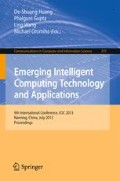Abstract
The exploding Web opinion data has the essential need for automatic tools to analyze people’s sentiments in many fields. Predicting the polarity of a product review is an important work in applications such as market investigation and trend analysis. In this paper, we focus on analyzing the Chinese sentiment word strengths and the sentiment drop point. We propose a novel algorithm based on the sentiment drop point algorithm to conduct sentiment polarity assignment. It predicts the sentiment polarity by a determinative policy which involves two classifiers simultaneously. The experiments show that our approach is efficient and suited for reviews analysis in different domains.
Access this chapter
Tax calculation will be finalised at checkout
Purchases are for personal use only
Preview
Unable to display preview. Download preview PDF.
References
Pang, B., Lee, L.: A sentimental education: Sentiment analysis using subjectivity summarization based on minimum cuts. In: Proceedings of the 42nd Annual Meeting on Association for Computational Linguistics, p. 271. Association for Computational Linguistics (2004)
Turney, P.D.: Thumbs up or thumbs down?: semantic orientation applied to unsupervised classification of reviews. In: Proceedings of the 40th Annual Meeting on Association for Computational Linguistics, pp. 417–424. Association for Computational Linguistics (2002)
Zagibalov, T., Carroll, J.: Automatic seed word selection for unsupervised sentiment classification of Chinese text. In: Proceedings of the 22nd International Conference on Computational Linguistics, vol. 1, pp. 1073–1080. Association for Computational Linguistics (2008)
Pang, B., Lee, L.: Seeing stars: Exploiting class relationships for sentiment categorization with respect to rating scales. Annual Meeting-Association for Computational Linguistics 43(1), 115 (2005)
Wilson, T., Wiebe, J., Hwa, R.: Recognizing strong and weak opinion clauses. Computational Intelligence 22(2), 73–99 (2006)
Wan, X.: Using bilingual knowledge and ensemble techniques for unsupervised Chinese sentiment analysis. In: Proceedings of the Conference on Empirical Methods in Natural Language Processing, pp. 553–561. Association for Computational Linguistics (2008)
Thelwall, M., Buckley, K., Paltoglou, G., Cai, D., Kappas, A.: Sentiment strength detection in short informal text. Journal of the American Society for Information Science and Technology 61(12), 2544–2558 (2010)
Thelwall, M., Buckley, K., Paltoglou, G.: Sentiment strength detection for the social web. Journal of the American Society for Information Science and Technology (2012)
Lu, Y., Kong, X., Quan, X., Liu, W., Xu, Y.: Exploring the sentiment strength of user reviews. Web-Age Information Management, 471–482 (2010)
Taboada, M., Brooke, J., Tofiloski, M., Voll, K., Stede, M.: Lexicon-based methods for sentiment analysis. Computational Linguistics 37(2), 267–307 (2011)
Cilibrasi, R.L., Vitanyi, P.M.B.: The google similarity distance. IEEE Transactions on Knowledge and Data Engineering 19(3), 370–383 (2007)
Zhang, J., Tang, J., Li, J.: Expert finding in a social network. Advances in Databases: Concepts. Systems and Applications, 1066–1069 (2007)
Author information
Authors and Affiliations
Editor information
Editors and Affiliations
Rights and permissions
Copyright information
© 2013 Springer-Verlag Berlin Heidelberg
About this paper
Cite this paper
Hao, Z., Cheng, J., Cai, R., Wen, W., Wang, L. (2013). Chinese Sentiment Classification Based on the Sentiment Drop Point. In: Huang, DS., Gupta, P., Wang, L., Gromiha, M. (eds) Emerging Intelligent Computing Technology and Applications. ICIC 2013. Communications in Computer and Information Science, vol 375. Springer, Berlin, Heidelberg. https://doi.org/10.1007/978-3-642-39678-6_10
Download citation
DOI: https://doi.org/10.1007/978-3-642-39678-6_10
Publisher Name: Springer, Berlin, Heidelberg
Print ISBN: 978-3-642-39677-9
Online ISBN: 978-3-642-39678-6
eBook Packages: Computer ScienceComputer Science (R0)

